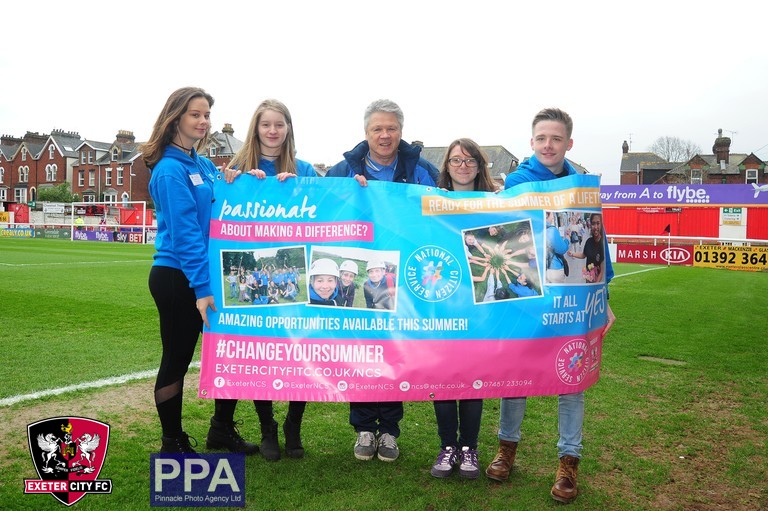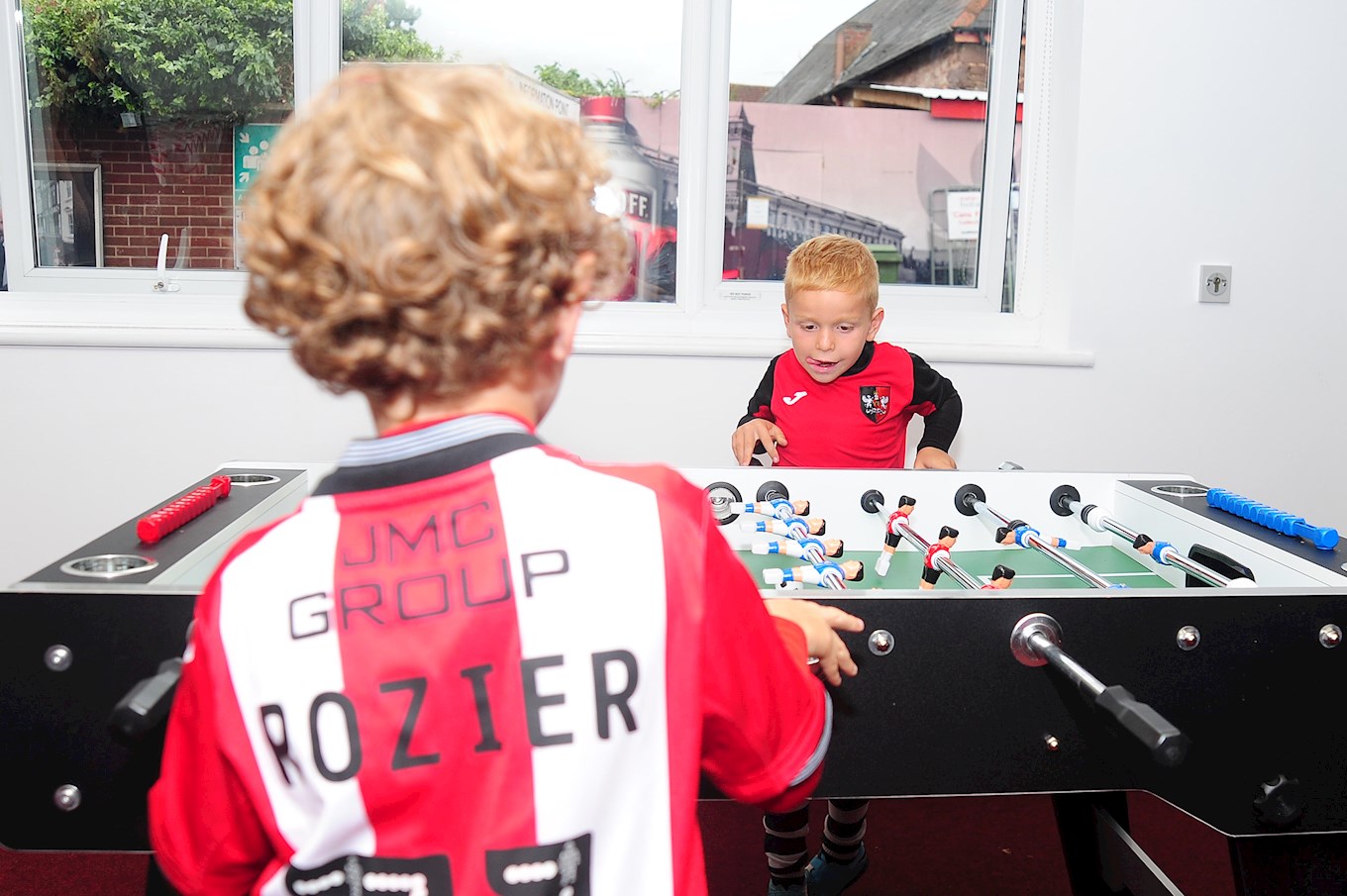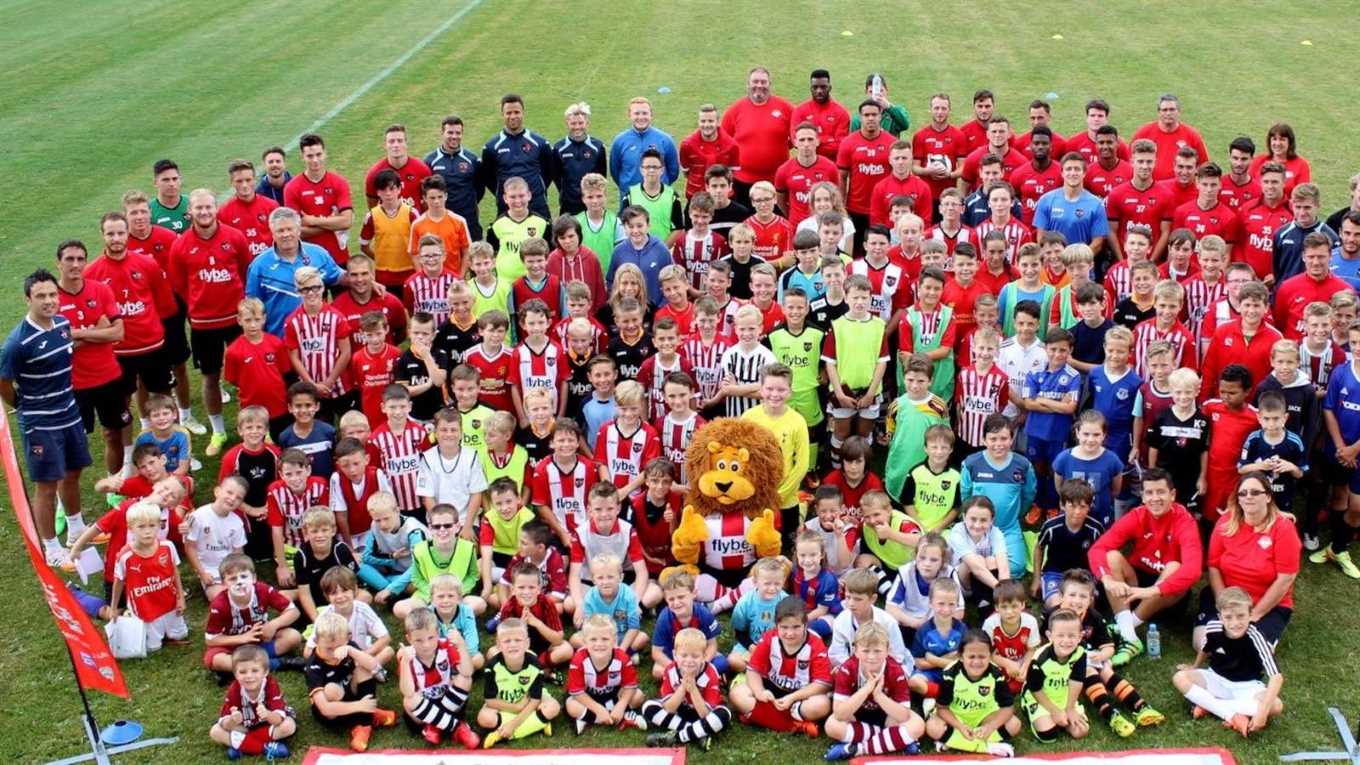Ahead of the club's NCS dedicated League Two match against Chesterfield - which has now been postponed - Exeter City's matchday programme The Grecian spoke to the head CITY Community Trust, Jamie Vittles, about the work the charity does and what it aims are for the future. Below is the interview in full.
FROM ITS HUMBLE BEGINNINGS, IN A DAMP, CRAMPED OFFICE IN THE OLD GRANDSTAND, CITY COMMUNITY TRUST HAS GROWN INTO A MUCH-LOVED AND RESPECTED CHARITABLE ORGANISATION IN EXETER AND THE WIDER DEVON COMMUNITY THAT NOW EMPLOYS MORE THAN 100 FULL-TIME AND PART-TIME STAFF.
You may know CITY Community Trust for its after-school football and holiday courses, but did you know its work has spread into delivering health, education, wellbeing and physical activity programmes which now reach and improve the lives of 45,000 members in the local community every year?
This work includes the National Citizen Service initiative which, thanks to the CITY Community Trust, will recruit more than 600 youngsters, aged 15 to 17, this year to take part in a programme which helps with their employability, university applications, self-confidence, social skills and problem solving experience, all to benefit them in later life.
The Grecian caught up with Jamie Vittles, head of CITY Community Trust, to talk about the charity’s work, its success and its aims for the future.
THE GRECIAN: Hi Jamie, today’s match is dedicated to highlighting the National Citizen Service (NCS), what is CITY Community Trust’s role in delivering that service?
JAMIE: The NCS programme is one of our major projects over the summer and autumn period. We’ve delivered it successfully for the last three years and we’ve seen numbers grow from as few as 30 young people aged 15-17 that would go away to a residential camp with us and do their social action planning and delivery projects. This summer we are looking at recruiting 625 young people, which is a huge boost. We have 21 schools and colleges that we can recruit the young people from. It’s all about bringing young people together from different backgrounds, different schools and colleges and looking at a social mix. We are going to be taking them out of their comfort zones on a week of adventure in the Brecon Beacons. Then they will have a week of looking at presentation skills and anxiety management, looking at the environment they live in and how they can be better people, which is held at Bicton College. Week three they will then plan a social action project, with our staff, and in week four they will look to deliver that project. Last year we saw some very impactful projects, such as looking at updating the visitor centre at HMP Exeter, as well as projects looking at preventing pollution and raising awareness of mental health issues. It’s a huge initiative which isn’t about football, and this is important to us, because we don’t just deliver football programmes.

This summer we are looking at recruiting 625 young people, which is a huge boost. We have 21 schools and colleges that we can recruit the young people from. It’s all about bringing young people together from different backgrounds, different schools and colleges and looking at a social mix. We are going to be taking them out of their comfort zones on a week of adventure in the Brecon Beacons. Then they will have a week of looking at presentation skills and anxiety management, looking at the environment they live in and how they can be better people, which is held at Bicton College. Week three they will then plan a social action project, with our staff, and in week four they will look to deliver that project. Last year we saw some very impactful projects, such as looking at updating the visitor centre at HMP Exeter, as well as projects looking at preventing pollution and raising awareness of mental health issues. It’s a huge initiative which isn’t about football, and this is important to us, because we don’t just deliver football programmes.
THE GRECIAN: So, NCS not only benefits the youngsters that go on course, it also benefits the wider community?
JAMIE: Yes, for the young people it’s great. It builds their social skills and takes them out of their comfort zone, helps them learn about public speaking and the planning of a social action project. When they’ve graduated through the programme they get a certificate signed off by Theresa May. That adds weight to work applications, college applications and UCAS personal statements. It shows people have given up four weeks of their summer holidays before they enrol at college or school sixth form, which is a big thing for a young person to do. Local charities, resident and community groups that people support would also benefit from being part of the programme. Hopefully, the parents and guardians of the young people will see a real difference with their sons and daughters after they’ve finished the programme, as well. We have certainly got some great case studies over the past three years, which can back this up.
THE GRECIAN: It’s been a busy year for CITY Community Trust with the charity changing its name from Football in the Community to the one it holds now, can you run us through that decision?
JAMIE: Yes, we evaluated the programmes last year and we worked out that 48 per cent of them were actually non-football related, so to have the word football in the name could potentially be a barrier to participants getting involved in programmes. Sponsors, patrons and donors may not necessarily like what football is about considering the money that goes into the game at Premier League level compared to other sports. They don’t think that money is needed in football, of course League Two isn’t like that, but it could still be a barrier. So, we made the decision to change the name and drop the word football and it makes a real difference. We celebrated this change with a relaunch last year and were really pleased when comedian Ade Edmondson, who’s well known as an Exeter City fan, joined us as patron of the charity.
THE GRECIAN: On the health and wellbeing side of the charity, CITY Community Trust organised the Exeter half marathons, as well as other things that fall under the health and wellbeing umbrella. How important is that work you do?

JAMIE: It is very important. When we first started, the organisation delivered primary-age football schemes, after-school and holiday programmes and weekly courses. We still do these and they are managed fantastically well by former Exeter City striker, Ben Watson. However, we’re now delivering a host of other projects focussed on health and wellbeing for young people and adults.
We’ve got a great team led by Pete Ferlie and Catherine White organising the mass participation events that we deliver, including the half-marathons and the Santa run, which are a way that we can get the community involved in physical activity. That may not be for everybody, but there are other programmes which look at getting adults more active which have health benefits both mentally and physically. We’ve got programmes that are funded through Sport England, the Premier League and the English Football League Trust, where we are looking at engaging with groups that struggle to get involved with mainstream activity. We work with some of the hardest to reach groups in our community, through initiatives like our homeless football project. We also have GP surgeries referring patients onto us that don’t have medical needs, but social needs, and we can provide activities for them.
THE GRECIAN: Exeter City Council is a strong supporter of the CITY Community Trust and the work that the charity does, does that give the football club a good link?
JAMIE: Yes, it does. Julian Tagg sits on the health and wellbeing board and the Greater Exeter Strategic Sports Board which looks at access to facilities in the greater Exeter area. I sit on the Active Exeter group, which involves a number of partners including the county sports partnership which is Active Devon, the city council and the school’s sports partnership. We look at the funding pot and the initiatives in the Exeter area, how they’re managed, coordinated and how they are accessible to all. The council doesn’t have a dedicated sport development unit anymore, so we’ve taken that remit for them and are delivering the programmes on the ground.
THE GRECIAN: What is the Man v Fat initiative, that has just started?
JAMIE: It’s a national programme, and we are now delivering it in Exeter. We had over 50 men sign up that have a Body Mass Index (BMI) of over 27.5, they play small-sided football at the Cliff Hill training ground on the new 3G facility. That’s great in itself because we get to open up that fantastic pitch to the community. They are put into five or six-a-side teams and they play each week in organised fixtures and then are graded points by how they get on in their matches and on how much weight they lose. It promotes a team ethos, and by looking at some of the groups they’ve got on Facebook, the support they can give each other is remarkable.

THE GRECIAN: When the charity started off it was mainly about half-term and after-school clubs, and you’ve now progressed onto the Junior Grecians lounge which is open on match days to young supporters, how pleased are you with the benefits that has brought?
JAMIE: Lots of our programmes link in with each other so having the Junior Grecians element is a way of us having junior supporters that come to the game. To make that experience better for them, the lounge offers the chance where young people can meet the players, have their birthday party, have refreshments, and play on the PlayStations. We can link all the programmes from Tots, which is for three to six-year-olds, to Junior Kickers, which is for seven to 14-year-olds, to our after-school programmes. There’s a whole host of programmes where we are linking children up with activity. To get them here on a match day, to get them to be part of the Trust and supporters of the club is massively important to us, because getting them involved and watching the games at a young age and creating a positive experience will keep them coming back. I’ve got to give big thanks to the Junior Grecians committee who commit their time voluntarily to support the scheme tirelessly.

THE GRECIAN: CITY Community Trust also has Ability Counts football teams, as well as links to the Exeter City Ladies who were struggling the summer before last. Is that one of the goals for the charity making football as accessible as possible?
JAMIE: Yes. The Ability Counts programme has about 90 players, adults and juniors, with physical, mental and learning difficulties. We have adult male teams, a female team and junior deaf teams who all train on a weekly basis. That’s a massively important programme for us, and it’s self-funded by the players. We get little pockets of money here and there that can support them, such as local sponsors, but they’re financing that themselves. And we stepped in a couple of years ago when the ladies’ team looked like they were in a position where they could fold. So, between myself and Julian, and a few others, we’ve put essential building blocks in place for the future. They’ve dropped down a league this season into the South West Women’s Premier Division, but they have a strong management team in Abbie Britton and Clive Watts. We’ve got some good players coming through the girls’ development programme, managed by Donna Langdon, which will then feed into the ladies’ side and the Exeter College Girls Academy. The future is bright for girls’ and women’s football at Exeter City FC.
THE GRECIAN: All this is a far cry from the humble beginnings of Football in the Community, can you tell us what is was like when you started?
JAMIE: When I first started, Tommy Wheeldon was doing my current job in the late 1990s. In the year 2000 he moved to Canada and I took on the role. At that time it was just me working with a small bank of casual staff. We delivered some after-school programmes and worked towards the school holidays. Over the next couple of years, Scott Walker and Danny Harris joined the team. In 2011 it was still quite a small workforce, but we started to diversify the programme, delivering education, as well as the mainstream development side of what we were originally doing. We saw a boost in resource and finance and as people recognised our ability to deliver with a diverse range of partners things went from strength to strength. We’ve now got more than 30 full-time contracted staff and 70-part time staff that will be on the ground daily. And there will be over 80 staff that will work on NCS this summer. Scott and Danny are still with us too and both do a superb job, which doesn’t go unrecognised by me.
THE GRECIAN: Do you see 2011 as the time the charity really took off?
JAMIE: Yes, in building towards our Futsal BTEC Academy programme, which is now running in conjunction with Exeter College, that started in 2012 and is now managed by another former Exeter City player, Chris Shephard. That was when we saw a real boost in what the charity was delivering. We were able to raise the awareness that it wasn’t just about primary age children playing football, we were looking at getting young people engaged in education by providing physical activity to the programme, as well as giving them the opportunity to represent Exeter City FC in a league coordinated by the English Football League Trust. That helped raise awareness of the charity and it’s gone from there. Our strong relationship with partners across Devon has meant that we’ve got a large number of high-quality programmes that are running, and hopefully people can now see that.
THE GRECIAN: What would some of your most memorable moments be?
JAMIE: Being recognised for some of the awards that we’ve had over the past few years has been especially memorable for me. Being asked to sit on various advisory boards also really shows how well respected the charity is now. It’s been nice to see how we’ve grown in comparison to other, bigger, football clubs. We’ve been able to build a strong board of trustees as well. Moving into the Fountain Centre, having this as our own community facility where we have an office for up to 25 members of staff. All of these milestones stand out for me and something that I am incredibly proud of.
THE GRECIAN: The office you first started in was by the old grandstand, what was that like?
JAMIE: It was damp, it leaked, and it had terrible heating! It’s so different now, still not as perfect as we would want it but it’s a far cry from where we first came from. The old ticket office used to be our store room.
THE GRECIAN: Would it be fair to say that the CITY Community Trust is punching above its weight when you consider that it is competing against other clubs, some at Premier League level, who have more resources?
JAMIE: Yes, for the size of the city and the club, the league that we are in, we are definitely punching above our weight. As a starting point, The Premier League community schemes would have up to £1m that they can access or apply to. We are nowhere near that level. There are different needs for different parts of the country, there are core programmes which all community schemes will be delivering like holiday clubs and after-school activities, but ultimately, it’s down to the area and the team that you have got around you. I’m very fortunate to have such an enthusiastic, professional and hardworking team of individuals behind me that offer our community such a wide-ranging, varied and high-quality selection of projects.

THE GRECIAN: How do you see things in the future?
JAMIE: We are always working on new projects, campaigns and initiatives. This year we will be re-tendering for the new NCS contract which would take us into 2022. We are looking at various employability programmes, we’ve just started a traineeship for unemployed 19-24 year-olds, and are about to start a new project in HMP Exeter and HMP Channings Wood. Positioning ourselves in the corporate arena is also on the agenda for CCT this year and with the appointment of new Business Development Manager, Craig Townsend, we have already the foundations in place to start this process. We want to build on the number of participants that access our programmes, making sure they are accessible to all, but ultimately, we want to ensure the quality of delivery remains high as we continue through this exciting period of growth.
For more information about the work of CITY Community Trust https://www.exetercitycommunitytrust.co.uk/
To find out more about how your business could work with CITY Community Trust contact Craig Townsend craig.townsend@ecfc.co.uk
